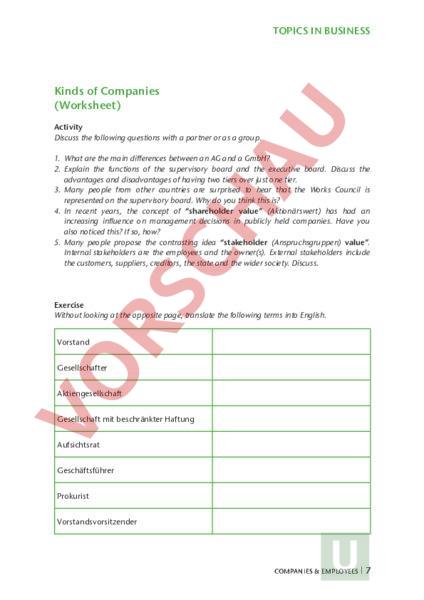Arbeitsblatt: Business English - Kinds of Companies
Material-Details
Thematischer Wortschatz Unternehmenssformen
Englisch
Wortschatz
11. Schuljahr
2 Seiten
Statistik
203404
369
1
06.10.2022
Autor/in
Daniel Cooper
Land: Deutschland
Registriert vor 2006
Textauszüge aus dem Inhalt:
TOPICS IN BUSINESS Kinds of Companies (Worksheet) Activity Discuss the following questions with partner or as group. 1. What are the main differences between an AG and GmbH? 2. Explain the functions of the supervisory board and the executive board. Discuss the advantages and disadvantages of having two tiers over just one tier. 3. Many people from other countries are surprised to hear that the Works Council is represented on the supervisory board. Why do you think this is? 4. In recent years, the concept of shareholder value (Aktionärswert) has had an increasing influence on management decisions in publicly held companies. Have you also noticed this? If so, how? 5. Many people propose the contrasting idea stakeholder (Anspruchsgruppen) value. Internal stakeholders are the employees and the owner(s). External stakeholders include the customers, suppliers, creditors, the state and the wider society. Discuss. Exercise Without looking at the opposite page, translate the following terms into English. Vorstand Gesellschafter Aktiengesellschaft Gesellschaft mit beschränkter Haftung Aufsichtsrat Geschäftsführer Prokurist Vorstandsvorsitzender COMPANIES EMPLOYEES 7 TOPICS IN BUSINESS The People Who Work in Companies Every company/business (Firma/Unternehmen) has employees (Mitarbeiter). In the U.S., the word associate is used very often instead of employee, especially by people who believe in political correctness. The P.C. people in the States also often call white-collar workers (Angestellte) salaried workers/associates (Gehaltsempfänger). The blue-collar workers (Arbeiter) are called hourly workers/associates or wage-earners (Lohnempfänger). Notice that all the people — not only production workers — who are employed in company can be called workers. The people who work at the same level as me in the company are my co-workers (Kollegen). The English word colleague is usually used in the professions, e.g. lawyers, doctors, professors and other freelancers (Freiberufler) or self-employed (selbständig) professionals. The people who are above me in the company hierarchy are my superiors (Vorgesetzten) and those under me are my subordinates (Mitarbeiter), the people in my department or direct reports, i.e. people who report directly to me. Everyone who works in company is either permanent employee/associate (fest angestellt) or temp(orary employee) (Zeit- bzw. Leiharbeiter). They will receive either salary (Gehalt) or wage (Lohn) which will be based on factors like the kind of job they do, how long they have been with the company and how good their performance (Leistung) is. Most companies operate with fixed set of wage and salary grades (Stufen). Trainees or, to use the old-fashioned word, apprentices (Azubis) spend part of their time in Vocational School (Berufsschule) and part of their time in the company. Management trainees (Trainees) are young, promising-looking employees, usually fresh out of university, which the company has put on the fast track. Interns (Praktikanten) stay with company only short time to gain some practical experience. The people who are free to negotiate (aushandeln) their salary are called exempt workers (außertariflich); non-exempt (tariflich) workers are covered by the union (Gewerkschaft) pay scale (Tarifvereinbarung). Note that the exempt status begins at much lower levels of the hierarchy in the U.S. and Britain than in Germany. In the U.S., even supervisor can be an exempt (managerial) position, whereas in Germany even Department Head can be non-exempt. 8 COMPANIES EMPLOYEES
